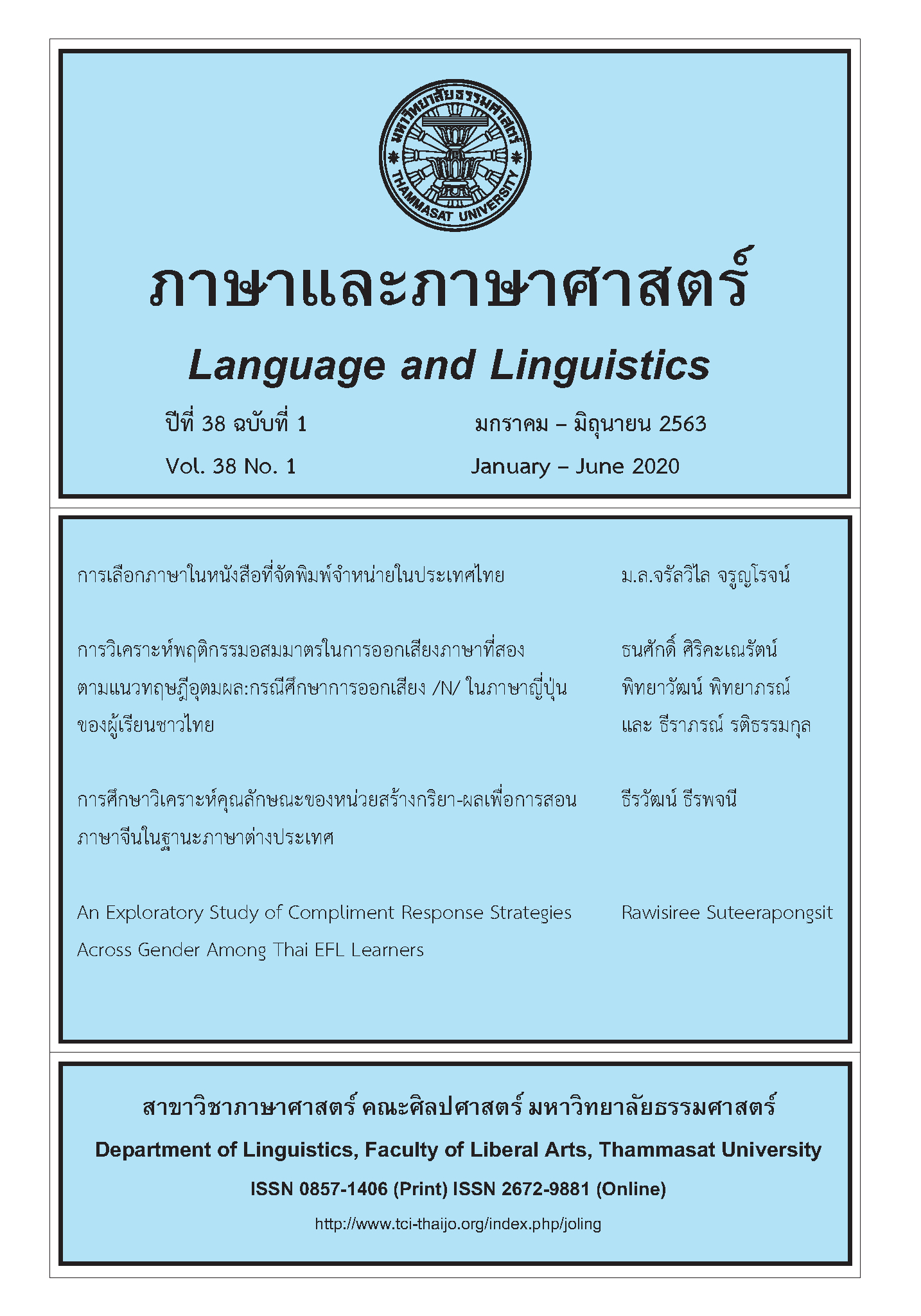An Exploratory Study of Compliment Response Strategies across Gender among Thai EFL Learners
Main Article Content
Abstract
Compliment responses are one of the most frequent speech acts in everyday conversation which are claimed to reflect gender differences. Apart from the compliment response behavior of native speakers, it is interesting to explore whether the assumed gender-based differences are also found in EFL context. The current study aims at examining Thai EFL learners’ usage of compliment responses in English, in relation to the gender of the interlocutors and the topic of the compliment. The data was collected from a role-play task designed to elicit compliment responses on four different topics from six male and six female Thai EFL learners. The findings suggest that the gender of the interlocutors and the topics of the compliments, to some degree, influence the employment of compliment response strategies at the micro level. This relationship is possibly a reflection of and thus attributable to the function of gender-based social values.
Article Details
บทความทุกบทความเป็นลิขสิทธิ์ของภาษาและภาษาศาสตร์
References
Boonyasit, A. (2005). Compliments and responses to compliments in Thai used by male, female, and effeminate male users (In Thai) (Master’s thesis) Retrieved from http://cuir.car.chula.ac.th/handle/123456789/14773
Brown, P., & Levinson, S. (1987). Politeness: Some universals in language usage. Cambridge, England: Cambridge University Press.
Cedar, P. (2006). Thai and American responses to compliments in English. The Linguistics Journal, 2(2), 6-28.
Chen, J., & Boonkongsaen, N. (2012). Compliment responses strategies by Thai and Chinese EFL teachers: A contrastive study. Theory and Practice in Language Studies, 2(9), 1860-1867.
Chen, R. (1993). Responding to compliments: A contrastive study of politeness strategies between American English and Chinese speakers. Journal of Pragmatics, 20(1), 49-75. https://doi.org/10.1016/0378-2166(93)90106-Y
Duan, A. W. (2008). The comparison between written DCT and oral role plays in investigation upon English refusal strategies by Chinese EFL students. Sino-US English Teaching, 5(10), 8-18.
Heidari, M. A., Rezazadeh, M., & Rasekh, A. E. (2009). A contrastive study of compliment responses among male and female Iranian teenage EFL learners. The International Journal of Language Society and Culture, 29, 18-31.
Herbert, R. K. (1986). Say “thank you” – or something. American Speech, 61, 76–88.
Herbert, R. K. (1989). The ethnography of English compliments and compliment responses: A contrastive sketch. In W. Oleksy (Ed.), Contrastive pragmatics. (pp. 3–35). Amsterdam, Netherlands: John Benjamins.
Herbert, R. K. (1990). Sex-based differences in compliment behavior. Language in Society, 19(2), 201 - 224.
Holmes, J. (1988). Paying compliments: A sex-preferential politeness strategy. Journal of Pragmatics, 12(4), 445-465. https://doi.org/10.1016/0378-2166(88)90005-7
Jaworski, A. (1995). “This is not an empty compliment!” Polish compliments and the expression of solidarity. International Journal of Applied Linguistics, 5(1), 63-94. https://doi.org/10.1111/j.1473-4192.1995.tb00073.x
Kaneshan, P. Y., & Bonyadi, A. (2016). The investigation of compliment response patterns across gender and age among advanced EFL learners. Journal of Language Teaching and Research, 7(4), 760-767. http://dx.doi.org/10.17507/jltr.0704.17
Leech, G. (1983). Principles of pragmatics. London, England: Longman.
Parisi, C., & Wogan, P. (2006). Compliment topics and gender. Women and Language, 29(2), 21- 28.
Phoocharoensil, S. (2012). L2 English compliment responses: An investigation of pragmatic transfer. International Journal of Applied linguistics & English Literature, 1(6), 276- 287. http://dx.doi.org/10.7575/ijalel.v.1n.6p.276
Poll revealed 45% of Thai men viewed ‘good-looking’ women do jobs that require ‘appearance’ more than ‘ability’. (2016, September 4). Matichon Online. Retrieved from https://www.matichon.co.th/lifestyle/news_273494 (In Thai).
Pomerantz, A. (1978). Compliment responses: Notes on the co-operation of multiple constraints. In J. Schenkein (Ed.), Studies in the organization of conversational interaction (pp. 79-112).Cambridge, MA: Academic Press.
Rees-Miller, J. (2011). Compliments revisited: Contemporary compliments and gender. Journal of Pragmatics, 43(11), 2673- 2688. https://doi.org/10.1016/j.pragma.2011.04.014
Salazar, P. (2008). Task analysis on mitigation in the speech act of requesting: Discourse completion task and role-play. In E. Alcón- Soler (Ed.), Learning how to request in an instructed language learning context. (pp. 143-161). Bern, Switzerland: Peter Lang.
Sasaki, M. (1998). Investigating EFL students' production of speech acts: A comparison of production questionnaires and role plays. Journal of Pragmatics, 30(4), 457- 484. https://doi.org/10.1016/S0378- 2166(98)00013-7
Talbot, M. (2010). Language and gender (2nd ed.). Cambridge, England: Polity Press.
Tang, C. H., & Zhang, G. Q. (2009). A contrastive study of compliment responses among Australian English and Mandarin Chinese speakers. Journal of Pragmatics, 41(2), 325–345. https://doi.org/10.1016/j.pragma.2008.05.019
Thornton, G. (2017). Grant Thornton survey finds the proportion of women leaders in Thailand continues to be in the top three countries in Asia Pacific [Press release]. Retrieved March 12, 2018, from https://www.grantthornton.co.th/press-releases/press-releases-2017/women-in-business-2017/
Yu, M. (2003). On the universality of face: Evidence from Chinese compliment response behavior. Journal of Pragmatics, 35(11), 1679–1710. https://doi.org/10.1016/S0378-2166(03)00074-2
Yu, M. (2004). Interlinguistic variation and similarity in second language speech act behavior. The Modern Language Journal, 88(6), 102-119. http://dx.doi.org/10.1111/j.0026-7902.2004.00220.x


